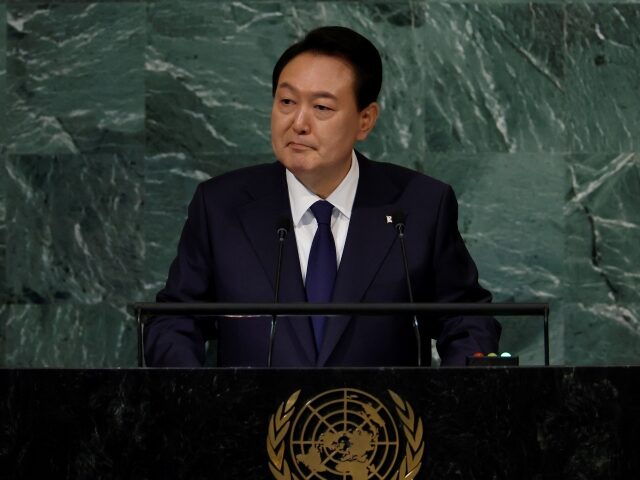South Korean President Yoon Suk-yeol, one of the few conservatives to win a presidency anywhere in the world this year, urged the United Nations in his speech on Tuesday to “stand together in solidarity” and defend freedom from wherever a threat may arise.
Yoon’s remarks, his first address to the annual General Assembly debate, echoed much of what he told Koreans in his inauguration speech in May. On that occasion, he used the word “freedom” 35 times; to the United Nations, he said “freedom” a mere 18 times, according to the organization’s official English-language transcript.
Unlike many other heads of state who address the forum, Yoon abstained from describing any particular international crisis or bringing up particular grievances. Yoon notably did not mention the 70-year-old war with North Korea and growing nuclear tensions with the country, tensions that appeared to worsen when Yoon offered an economic cooperation plan and communist dictator Kim Jong-un’s sister told him to “shut his mouth.”
“When freedom of any individual in a nation comes under threat, members of the community must join hands to remove the threat and defend freedom,” Yoon said. “Likewise, when freedom of any citizen or nation in the global community is in peril, it is the community of nations that must stand together in solidarity to defend that freedom.”
Yoon discussed his definition of freedom at length.
“Genuine freedom is not just being free from the shackles but having opportunities to live life to the fullest with dignity,” he told the General Assembly. “Genuine peace is not an absence of war but removing conflict and enmity that hold back shared progress of humanity and building the foundation for greater prosperity.”
“Genuine freedom and peace can turn into reality when we are free from disease and hunger, free from illiteracy and free from want of energy and culture,” he continued.
During his inauguration, the first mass event in South Korea of its size since the Chinese coronavirus pandemic began, Yoon similarly philosophized on the meaning and value of freedom, urging Koreans to “must clearly define – and unequivocally reaffirm – the real meaning of freedom.”
“Human history shows that when political and economic freedom reigns supreme, that is where prosperity and abundance flourished. When prosperity and economic freedom flourishes, that is when freedom reaches even the darkest corners,” he asserted at the time, statements with a particularly heavy meaning after two years of restrictions triggered by the spread of disease.
The few specifics Yoon offered to the United Nations were in relation to the Chinese coronavirus pandemic. South Korea has been one of the world’s most restrictive governments, including under leftist former President Moon Jae-in, regarding freedom of movement during the pandemic. As a presidential candidate, Yoon suggested a plan to offer reparations to businesses destroyed by government lockdowns in the name of preventing the spread of the disease.
To the United Nations, Yoon boasted that South Korea was working to secure a prominent role in coronavirus vaccine development and the construction of a “more robust global health architecture.”
“Korea has accelerated research and development for [Chinese coronavirus] therapeutics and vaccines, pledging 300 million dollars toward the ACT-A Initiative and 30 million dollars to the Financial Intermediary Fund of the World Bank,” Yoon said, among others, thereby expanding its contributions to building a more robust global health architecture.”
“To ensure a more effective response to future infectious disease outbreaks, Korea will host a ministerial meeting of the Global Health Security Agenda (GHSA) in Seoul this November. We are also taking part in negotiations to reach a pandemic accord under the World Health Organization,” he added.
Yoon concluded by thanking the United Nations for its role in the existence of South Korea.
“The very first mission of the United Nations after its founding was to approve the Republic of Korea as the sole legitimate government on the Korean Peninsula, and to defend the freedom of my country by sending over UN forces during the Korean War,” he recalled. “Thanks to such efforts by the United Nations, Korea was able to become what it is today. As such, the Republic of Korea will protect and expand the freedom of global citizens; and together with the United Nations, we will fulfill our responsibilities to promote peace and prosperity around the world.”

COMMENTS
Please let us know if you're having issues with commenting.